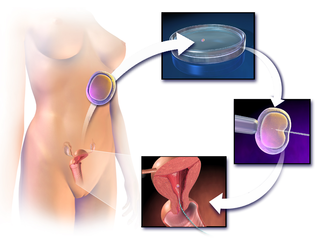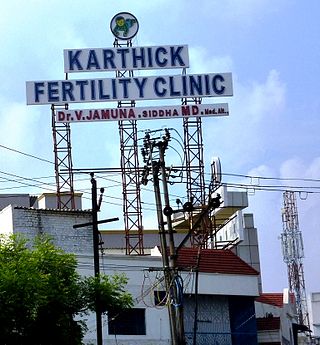Related Research Articles

In vitro fertilisation (IVF) is a process of fertilisation where an egg is combined with sperm in vitro. The process involves monitoring and stimulating a woman's ovulatory process, removing an ovum or ova from her ovaries and letting sperm fertilise them in a culture medium in a laboratory. After the fertilised egg (zygote) undergoes embryo culture for 2–6 days, it is transferred by catheter into the uterus, with the intention of establishing a successful pregnancy.

The Human Fertilisation and Embryology Authority (HFEA) is an executive non-departmental public body of the Department of Health and Social Care in the United Kingdom. It is a statutory body that regulates and inspects all clinics in the United Kingdom providing in vitro fertilisation (IVF), artificial insemination and the storage of human eggs, sperm or embryos. It also regulates human embryo research.

Assisted reproductive technology (ART) includes medical procedures used primarily to address infertility. This subject involves procedures such as in vitro fertilization (IVF), intracytoplasmic sperm injection (ICSI), cryopreservation of gametes or embryos, and/or the use of fertility medication. When used to address infertility, ART may also be referred to as fertility treatment. ART mainly belongs to the field of reproductive endocrinology and infertility. Some forms of ART may be used with regard to fertile couples for genetic purpose. ART may also be used in surrogacy arrangements, although not all surrogacy arrangements involve ART. The existence of sterility will not always require ART to be the first option to consider, as there are occasions when its cause is a mild disorder that can be solved with more conventional treatments or with behaviors based on promoting health and reproductive habits.
Embryo donation is one disposition option for users of in vitro fertilisation with remaining fresh or frozen embryos. It is defined as the giving—generally without compensation—of embryos remaining after in vitro fertilization procedures to recipients for procreative implantation or research. Most IVF users with supernumerary embryos make embryo donation decisions after completing their families or discontinuing use of in vitro fertilization. Recipients of embryos donated for procreative implantation typically plan to transfer fresh or frozen embryos into a prepared uterus in order to facilitate pregnancy and childbirth. Recipients of embryos donated for research typically use them for clinical training, quality improvement research, or human embryonic stem cell research.
Third-party reproduction or donor-assisted reproduction is any human reproduction in which DNA or gestation is provided by a third party or donor other than the one or two parents who will raise the resulting child. This goes beyond the traditional father–mother model, and the third party's involvement is limited to the reproductive process and does not extend into the raising of the child. Third-party reproduction is used by couples unable to reproduce by traditional means, by same-sex couples, and by men and women without a partner. Where donor gametes are provided by a donor, the donor will be a biological parent of the resulting child, but in third party reproduction, he or she will not be the caring parent.

A sperm bank, semen bank, or cryobank is a facility or enterprise which purchases, stores and sells human semen. The semen is produced and sold by men who are known as sperm donors. The sperm is purchased by or for other persons for the purpose of achieving a pregnancy or pregnancies other than by a sexual partner. Sperm sold by a sperm donor is known as donor sperm.
Egg donation is the process by which a woman donates eggs to enable another woman to conceive as part of an assisted reproduction treatment or for biomedical research. For assisted reproduction purposes, egg donation typically involves in vitro fertilization technology, with the eggs being fertilized in the laboratory; more rarely, unfertilized eggs may be frozen and stored for later use. Egg donation is a third-party reproduction as part of assisted reproductive technology.
A donor offspring, or donor conceived person, is conceived via the donation of sperm or ova, or both.

Fertility clinics are medical clinics that assist couples, and sometimes individuals, who want to become parents but for medical reasons have been unable to achieve this goal via the natural course. Clinics apply a number of diagnosis tests and sometimes very advanced medical treatments to achieve conceptions and pregnancies.
Sammy Lee was an expert on fertility and in vitro fertilisation

The Human Fertilisation and Embryology Act 1990 is an Act of the Parliament of the United Kingdom. It created the Human Fertilisation and Embryology Authority which is in charge of human embryo research, along with monitoring and licensing fertility clinics in the United Kingdom.
Donor registration facilitates donor conceived people, sperm donors and egg donors to establish contact with genetic kindred. Registries are mostly used by donor conceived people to find out their genetic heritage and to find half-siblings from the same egg or sperm donor. In some jurisdictions donor registration is compulsory, while in others it is voluntary; but most jurisdictions do not have any registration system.
Sperm donation laws vary by country. Most countries have laws to cover sperm donations which, for example, place limits on how many children a sperm donor may give rise to, or which limit or prohibit the use of donor semen after the donor has died, or payment to sperm donors. Other laws may restrict use of donor sperm for in vitro fertilisation (IVF) treatment, which may itself be banned or restricted in some way, such as to married heterosexual couples, banning such treatment to single women or lesbian couples. Donated sperm may be used for insemination or as part of IVF treatment. Notwithstanding such laws, informal and private sperm donations take place, which are largely unregulated.
NGDS may refer to:
Fertility tourism is the practice of traveling to another country or jurisdiction for fertility treatment, and may be regarded as a form of medical tourism. A person who can become pregnant is considered to have fertility issues if they are unable to have a clinical pregnancy after 12 months of unprotected intercourse. Infertility, or the inability to get pregnant, affects about 8-12% of couples looking to conceive or 186 million people globally. In some places, rates of infertility surpass the global average and can go up to 30% depending on the country. Areas with lack of resources, such as assisted reproductive technologies (ARTs), tend to correlate with the highest rates of infertility.
Sperm donation is the provision by a man of his sperm with the intention that it be used in the artificial insemination or other "fertility treatment" of one or more women who are not his sexual partners in order that they may become pregnant by him. Where pregnancies go to full term, the sperm donor will be the biological father of every baby born from his donations.The man is known as a sperm donor and the sperm he provides is known as "donor sperm" because the intention is that the man will give up all legal rights to any child produced from his sperm, and will not be the legal father. Sperm donation may also be known as "semen donation".
Religious response to assisted reproductive technology deals with the new challenges for traditional social and religious communities raised by modern assisted reproductive technology. Because many religious communities have strong opinions and religious legislation regarding marriage, sex and reproduction, modern fertility technology has forced religions to respond.
Mitochondrial replacement therapy (MRT), sometimes called mitochondrial donation, is the replacement of mitochondria in one or more cells to prevent or ameliorate disease. MRT originated as a special form of in vitro fertilisation in which some or all of the future baby's mitochondrial DNA (mtDNA) comes from a third party. This technique is used in cases when mothers carry genes for mitochondrial diseases. The therapy is approved for use in the United Kingdom. A second application is to use autologous mitochondria to replace mitochondria in damaged tissue to restore the tissue to a functional state. This has been used in clinical research in the United States to treat cardiac-compromised newborns.

The Assisted Human Reproduction Act is law enacted by the Parliament of Canada. Its purpose is to regulate assisted human reproduction (AHR) and related research. It is one of the most comprehensive pieces of legislation in the world concerning reproductive technologies and related research. It was introduced and passed in 2004 and was fully in force by 2007.
References
- ↑ http://www.bionews.org.uk/page_52879.asp Will sports fans have 'the balls' for sperm donation?
- ↑ "AgenziaMI Rimedi Naturali – La tua guida per salute, stile di vita, bellezza". www.agenziami.it. Retrieved 2022-12-19.
- ↑ "Online ads for sperm donors called offensive". the Guardian. 2007-03-26. Retrieved 2022-12-19.
- ↑ "THE SEED TRUST RELAUNCHES WITH HELP FROM THE EDNA PROJECT". Edna Project. Retrieved 21 May 2022.